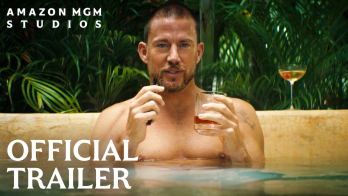The 12th Annual Art For Life Fundraiser at Russell Simmons East Hampton’s estate is just days away and GlobalGrind is speaking to this year’s Honorees, individuals recognized by RUSH Philanthropic for their positive contributions to their communities through giving.
Watch this space daily to learn about the work of committed individuals who care about the next generation of leaders, thinkers and doers: children. You can also visit
www.rushphilanthropic.org to donate and to Inspire a RUSH Kid and Text RUSH to 50555. Your $10 donation will help continue support Rush Kids and their groundbreaking education programs!
Last Friday we spoke to Honoree Edward Norton, renowned actor (The 25th Hour, American History X, The Usual Suspects) writer, director and philanthropist. Here’s some of what was said.
GlobalGrind: What does it mean to be recognized for your philanthropical work by RUSH?
Edward Norton: It’s a great compliment. I’ve known Russell a long time and, to me, Russell is a real model of a person. I am both flattered by the compliment of him and RUSH acknowledging the things I’ve tried to do. I am also happy to support their event. I think when they can honor people, it helps them connect new people to their work and their mission. I think that’s important, so I’m happy to do it to support them as well.
[pagebreak]
The event in the East Hamptons recognizes individuals who have done work for their community and also includes an art auction. Can you tell us what your first encounter with art was like and how it has enriched your life in some way?
I have an uncle who is a painter. I grew up in a family with visual art, art that was actually done by someone in my family. I remember being in my uncle’s studio when I was young, so it always seemed powerful to me … just the idea. He painted cool, abstract paintings and I had an early introduction to the idea that art was a way of making the literal world more metaphoric or more symbolic. So, I was lucky in that sense. It was always a part of my life.
[pagebreak]
Can you talk a little bit about Crowdrise and how you’re using social media to get philanthropy out to the masses?
CrowdRise grew out of a couple things. One was during Obama’s campaign. One of the things that struck me, like everybody, was not just that he got millions of young people to take ownership of that movement by donating small donations. More significant to me was that just by giving people a few of the early social networking tools, like his My Barack Obama webpages, where he asked you to set a goal and fundraise. He got young people, who did not have a lot of money to give, to raise through their networks and friends and family, significant multiples of what they were able to give themselves.
I thought that there was a transformative kind of indication in that, in the sense that it showed you that young people, all people, but especially young people, with these new tools of connecting to each other, have the ability to create impact larger than their own financial capacity. And I think that’s an incredibly empowering idea. We wanted to make that kind of leverage possible for all causes and all organizations. We wanted to tap the power that people have in their networks and their own circles and communities to help organizations achieve what he achieved, which is turning their existing supporters into more than just donors but into fundraisers.
The second thing was, as someone who is involved in a lot of organizations, I have always been horrified by the expense that goes into fundraising. The dirty secret of raising money for charity which will, even at RUSH, is that events cost a lot of money to produce. So, you raise money but you spend a lot of money to raise money. The more I was involved with organizations that I cared about, the more I saw that. Sometimes it’s incredibly inefficient the ways that we raise money; and online fundraising, this kind of grassroots crowd source fundraising, carries extremely, extremely low costs. Organizations often spend 20-40 percent of every dollar raised in their fundraising efforts and through crowd source fundraising like on CrowdRise, organizations are usually paying less than 6 percent in the total costs. We wanted to try and create a new revolution in efficiency so that organizations were raising money in a much more cost effective way and those were the things we set out to do. It’s been an incredible experience because the amount of money that people give each year online, it just sky rockets. It goes up by enormous increments every year and I think we’re in the middle of a really transformative moment in terms of the way that people are empowered to interact with the causes that they care about in a very direct way. That’s what CrowdRise is all about.
[pagebreak]
We also, obviously if you look at it, we want it to be fun. We don’t want charity … I don’t even like the word charity. Charity is this idea of throwing someone else money or something like that. I like words like “activism” and “social entrepreneurship.”
I think that when you ask people to participate, to get behind the work of the world, that’s improving the world and you ask them to do it actively through their networks, through their ability to communicate with other people, to be creative, to have a lot of fun, then you’re offering them the chance, an experience, that’s life expanding. You want people to engage in causes not because school or the National Society of Honors says you have to do it to get into college but because they realize that it’s one of the most exciting, fun things that they do. It has to be fun they way playing sports is fun, the way anything is fun. You do it because of the people you meet, because of the good times you have, the laughs, you want people to realize this kind of engagement enriches their lives in fun ways. We’ve tried to make sure that CrowdRise is a platform where people can really express themselves creatively and be in a community of other people that are having a lot of fun doing this kind of work.
[pagebreak]
Congratulations on the successful launch. Can you tell us what advice you would give a young person who’s interested in becoming an actor and a philanthropist just like yourself?
I think that being an actor is a very specific sort of impulse. I’d say the same thing I’d say about any art or creative art. Being famous is not something you can ever control, so you really should only do those things I think if you’re obsessed with them. If you do it in your basement, if you play music alone in your basement, if you read plays, watch movies, if you find yourself wanting to express yourself that way in some downtown club or some downtown theatre.
It’s not necessarily about what other people think of you but what you have to say. I think you have to ask yourself, What have you got to say?’ and ‘What do you want to observe about the world around you?’ You have recognize you’re making music for other people. You’re making films or plays for other people and you’re doing it to try and make other people feel connected to each other. So, you have to think about what you want to say first and connect. I think the main thing is to think about how what you’re doing is going to connect people. Philanthropy isn’t a function of getting rich or famous… I think that’s the thing about Crowdrise I love. We just saw a 13-year-old girl raise over $8,000 for a hospital project in Africa that she read about. There are people who give billions of dollars, and there are people who give their time and energy and have just as much impact. Philanthropy is about engaging with the world, and what’s making the world more the way you think it ought to be. You can do that in all kinds of ways. You don’t have to be famous, you don’t have to be rich. You don’t have to be an artist. You can be creative and passionate no matter what your working life is.
[pagebreak]
Are there any other projects you would like to let us know about?
No, I think Crowdrise is a good one to focus on. I serve on President Obama’s Committee for The Arts and Humanities and one of the things that we support is maintenance of arts education because one of the things that’s been shown is that arts education programs promote creative, dynamic thinking in people. People do better in math. They do better across the board in their educational categories when they have training in creative thinking and art. So what RUSH is doing is very important because its not about just the spiritual value of art. It’s training young people to think a certain way, to think creatively and it has impact on our economy, on our technology, on all aspects of our life. So I think it’s great that RUSH promotes the exposure and training in the arts for young people who don’t have it.
















